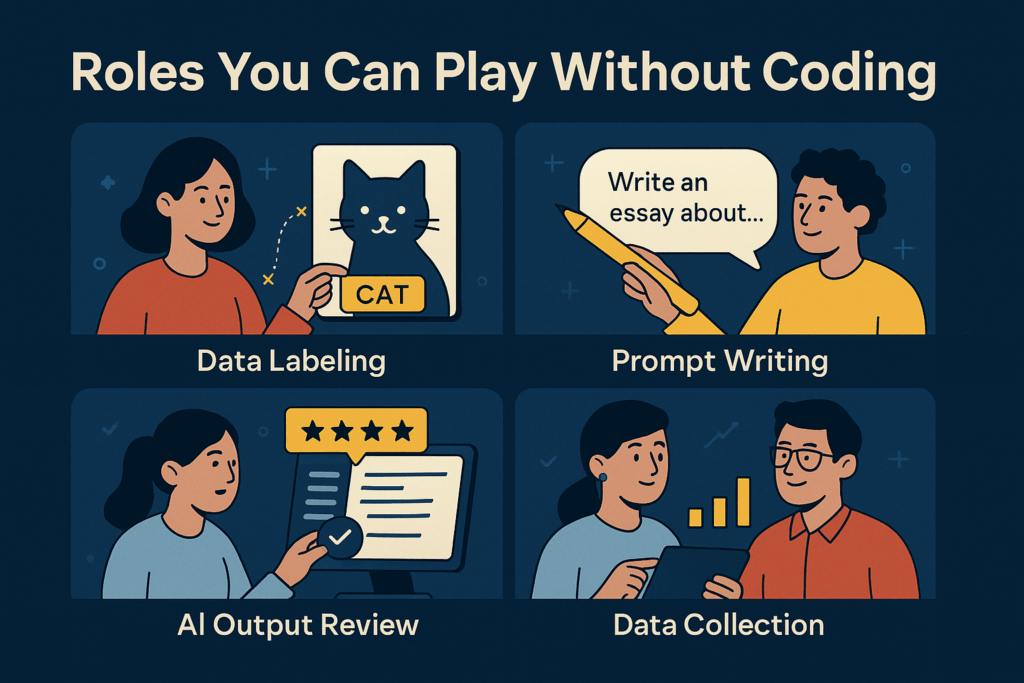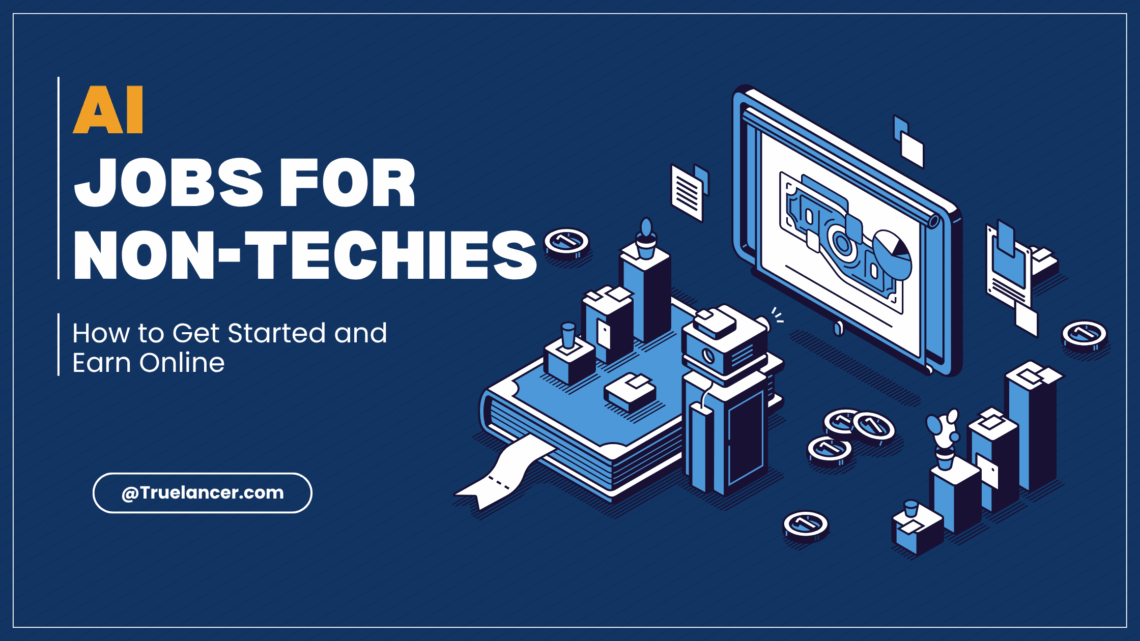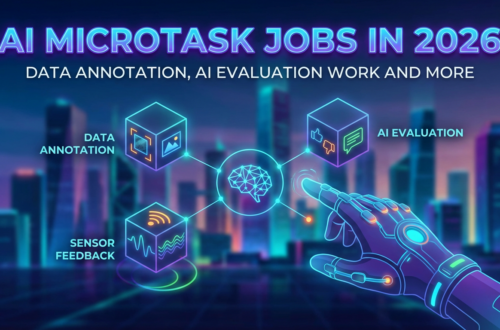A Beginner’s Complete Guide to Working in AI Projects Without Technical Skills
Artificial Intelligence (AI) may seem like it belongs to a world of data scientists and engineers—but you don’t need to write a single line of code to be a valuable part of the AI ecosystem. From data labeling to reviewing AI outputs, there are genuine, well-paying roles available for anyone with focus, curiosity, and consistency.
This comprehensive guide will walk you through what these jobs are, where to find them, how to get started, and how to grow. Whether you’re a student, freelancer, career switcher, or side-hustler, you can begin contributing to machine learning projects right away—and get paid for it.

🧠 Not Just for Coders: How Everyday People Are Powering AI
AI systems like ChatGPT, self-driving cars, and recommendation engines don’t operate in a vacuum. They rely heavily on human feedback, guidance, and supervision, especially in the training phase. These contributions fall into three main categories:
✔ Training data – You help label and structure data that machines learn from.
✔ Clear instructions – You create real-world scenarios or prompts that teach AI how humans think.
✔ Quality control – You review outputs to ensure they’re helpful, ethical, and accurate.
🧩 These tasks are essential to the development of safe, responsible AI—and they’re open to anyone with the right approach.
🛠️ Roles You Can Play Without Coding

Here’s a detailed breakdown of coding-free roles you can explore in AI development:
🏷️ 1. Data Labeling: Teaching AI Through Examples
What you do:
- Draw bounding boxes around objects in images
- Tag text sentiment (positive/neutral/negative)
- Categorize emails, product descriptions, or website content
- Label speech clips or sound effects
Tools you might use:
- Label Studio, SuperAnnotate, Amazon SageMaker Ground Truth
Who it’s for:
People with good attention to detail, even if you have no tech experience.
📌 Why it matters: All AI models are trained on structured data—your work forms the backbone of learning.
✍️ 2. Prompt Writing: Feeding Ideas Into the Machine
What you do:
- Write instructional text or questions for AI to respond to
- Generate creative writing prompts
- Provide context-based variations of commands
Example tasks:
- “Create a business pitch for a food delivery startup”
- “Summarize this legal paragraph for a 10-year-old”
- “Give five email subject lines for a product launch”
Skills needed:
Good writing ability, creative thinking, and familiarity with LLMs like ChatGPT or Claude.
📌 Why it matters: Your prompts help train and benchmark LLMs to understand and fulfill real human requests.
🧐 3. Reviewing AI Outputs (RLHF): Ensuring AI Stays Smart and Safe
What you do:
- Compare two answers and rank the better one
- Rate responses for helpfulness, tone, accuracy
- Flag any that seem offensive or incorrect
Platforms you might work with:
Outlier AI, Scale AI, Anthropic, Remotasks
📌 Why it matters: Human feedback is the key to making AI safer, less biased, and more useful in the real world.
🔍 4. Search Engine Evaluation: Training AI-Powered Search
What you do:
- Assess whether search results match user queries
- Identify which snippet or result is most relevant
- Help tune AI rankings for better user satisfaction
Good for:
Analytical thinkers and people familiar with online search patterns.
📌 Why it matters: You help train the next generation of AI-driven search experiences.
🎙️ 5. Transcription & Voice Tagging: Helping AI Understand Language
What you do:
- Transcribe spoken audio into text
- Tag background noise, emotions, or speakers
- Identify and tag regional accents or tone shifts
Key platforms:
Appen, TranscribeMe, Lionbridge, Deepgram contributor programs
📌 Why it matters: Your input improves voice assistants and multilingual AI systems.
🧽 6. Content Moderation: Protecting AI from Ethical Pitfalls
What you do:
- Monitor AI-generated content for inappropriate or unsafe outputs
- Apply platform policies to filter violent, abusive, or biased content
- Label gray areas for internal AI training
📌 Why it matters: Without moderation, AI systems can cause harm. Your work adds a critical ethical layer.
🧑🏫 7. Conversational Roleplaying: Teaching AI Emotional Intelligence
What you do:
- Simulate natural conversations with AI in diverse roles (customer, teacher, child)
- Offer feedback on logical flow, emotional tone, politeness
- Help AI sound more human and natural
📌 Why it matters: This is how AI learns to be context-aware and user-friendly in real-world dialogue.
🌍 Where to Find Legitimate AI Microtask Jobs

Here are trustworthy platforms to explore:
| Platform | Roles Available |
|---|---|
| Remotasks | Labeling, AI review, image annotation |
| Toloka (by Yandex) | Search evaluation, text categorization |
| Appen | Prompt writing, transcription, content eval |
| Scale AI / Outlier | Prompt design, RLHF, model testing |
| uTest | Usability + search ranking tasks |
| Truelancer | Freelance gigs including AI support tasks |
💡 Create accounts on 2–3 of these to maximize task availability and income.
💸 Earning Potential Breakdown
| Role | Estimated Pay |
|---|---|
| Data Labeling | $5 – $15/hour |
| Prompt Writing | $10 – $40/task |
| AI Output Review | $15 – $30/hour |
| Search Evaluation | $8 – $20/hour |
| Transcription | $1 – $3/minute of audio |
| Content Moderation | $10 – $25/hour |
| Conversational Training | $15 – $35/hour |
📈 Earnings depend on task complexity, platform, and your consistency.
🧠 Skills You Need (No Degree Required)
Focus on these core abilities:
- Attention to Detail: Label and review content accurately
- Critical Thinking: Spot errors, flaws, and relevance
- Communication: Write prompts, summaries, or feedback clearly
- Creativity: Frame useful and diverse prompts
- Ethical Reasoning: Understand fairness, safety, and neutrality
🌱 Optional extras: A basic grasp of how AI works will give you an edge—but you can learn that as you go.
🚀 How to Start: Your Action Plan

- Choose a role that fits your strengths (creative, detail-focused, analytical)
- Sign up on platforms like Remotasks, Appen, or Truelancer
- Take onboarding tests or tutorials to get access to live tasks
- Create a strong profile—focus on clarity, reliability, and niche interests
- Complete your first tasks, even if they’re small—build experience
- Join online communities to learn, share tips, and get referrals
- Track your performance—accuracy and speed often unlock better jobs
📈 Pro Tips for Earning More
- ✅ Be Consistent: The more you work, the more you unlock
- 🧭 Niche Down: Specialize in domains like medical, finance, or legal content
- 💬 Join Communities: Reddit’s r/AIJobs, Discord servers, and freelancer forums help with leads and tips
- 📚 Keep Learning: Watch YouTube tutorials, read AI blogs, and take micro-courses
🌟 Final Thoughts: Be the Human Behind the Machine
AI is not just about machines—it’s about humans teaching machines to be useful, ethical, and intelligent. You don’t need a degree, coding skills, or even a tech background to get involved.
Whether you’re looking to make $50 extra a week or pivot into the AI field long-term, these opportunities are real, accessible, and growing.
🚀 Start today. Teach the machines. Earn as you learn. Shape the future.






